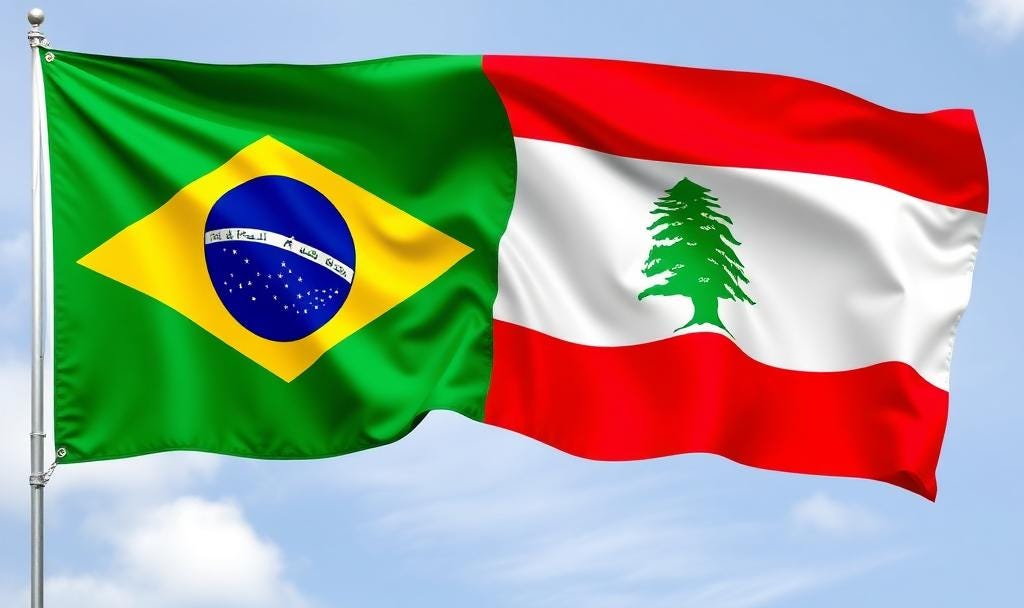Sports Diplomacy, Legacy & Belonging: What the Lebanese Taught Me About Home - #WWG03
A reflection on silent alliances, diasporic power, and the lasting bond between Brazil and Lebanon
In this edition:
Personal reflections on how Lebanese professionals helped me find belonging in the Gulf
A tribute to the Brazilian–Lebanese alliance in sports and beyond
A historical overview of Syrian-Lebanese migration to Brazil
Why legacy is more powerful than short-term gain
How we uphold sports diplomacy through daily gestures
Fieldnote from the ground
In the world of global sports, victories are often counted in medals and ratings.
But for those of us behind the scenes, the real diplomacy happens long before the cameras roll—over coffee, across deadlines, in languages not our own.
As a Brazilian woman navigating the Middle East, I didn’t just survive these spaces. I was welcomed into them.
And more often than not, it was the Lebanese who opened the door.
5 Lessons the Lebanese Taught Me About Sports Diplomacy
1. The Invisible Power of the Brazilian-Lebanese Alliance
Brazil is home to the largest Lebanese diaspora in the world. What many see as a cultural footnote, I see as a quiet superpower. This alliance—historic, familial, and economic—has built trust across oceans. And in the sports world, trust is everything.
2. Lebanese Excellence Across the Gulf
From Doha to Riyadh, I’ve watched Lebanese professionals lead with precision, passion, and integrity. They build institutions, broker partnerships, and shape industries—with a work ethic that commands respect and a generosity that builds community.
3. How They Made Me Feel at Home
I came here with a passport and a purpose. But it was the Lebanese who gave me orientation, invitations, and a sense of place. They brought me to the beaches. They called me ‘sister.’ They reminded me that diaspora is not just dislocation—it’s legacy.
From Abu Dhabi to Al Ain, Sharjah and Dubai, I’ve watched Lebanese professionals lead with precision, passion, and integrity.
4. What This Teaches Us About Sports Diplomacy
True diplomacy doesn’t always wear a badge. It lives in the way communities uphold each other across borders. The Brazilian–Lebanese alliance isn’t a geopolitical headline—it’s a living practice of solidarity, trade, heritage, and care.
5. Why I Will Always Celebrate This Alliance
In every contract I sign and stadium I enter, I carry the gratitude of being shaped by this bond. I will always honour it, not just for what it gave me—but for what it represents in a world where alliances like this can be our best path forward.
The bond you don’t need to explain
Sometimes, the most powerful alliances don’t come from summits or treaties. They come from gestures. From being brought into someone’s home. From being fed before being questioned. From hearing, in a new country, a familiar story about departure, adaptation, and survival.
That’s how the Lebanese alliance felt to me. Unspoken, but unmistakable. Their presence in the Gulf reminded me of our shared histories—not only of migration, but of resilience.
The legacy Brazil carries with pride
When thousands of Lebanese and Syrian families left the Ottoman Empire seeking new beginnings, Brazil became their second homeland. , From Beirut to Brazil - Georgetown A Lebanese online archive chronicles
We welcomed them with the little we had and watched them become some of our finest businesspeople, educators, politicians, and neighbours. They didn't just integrate—they elevated the spaces they touched. I grew up seeing this community not as foreign, but as Brazilian. Fully.
That pride follows me now. It shapes how I walk into a room when I’m working in the Gulf. I know I come from a country that didn’t close its doors. I come from a people who know how to receive, and who are now being received in return.
In many ways, my presence here today is the continuation of that journey. We once gave shelter; now I’m being sheltered in return.
Lebanese presence in the Gulf: a sense of familiarity
Unlike other expat communities I’ve encountered, the Lebanese presence in the Gulf always felt more familiar to me—less foreign. Not always easy, not perfect, but recognizable in a way that mattered. There was a shared rhythm, a shared resilience, a certain cultural proximity that made it easier for me to navigate.
This wasn’t about dramatic gestures or flawless harmony. It was about small things: being spoken to with curiosity, not suspicion. Being introduced rather than overlooked. Feeling, instinctively, that I belonged.
I’m not here to romanticize. I’ve seen the pressures, the hierarchies, the inconsistencies. But what stood out was the sense of continuity—that what we do as Brazilians in these spaces reflects on our Lebanese partners, just as what they do reflects on us.
We share reputations in the international market. We carry each other’s legacy. And we should look out for each other accordingly.
Closing Reflection
There is a significant presence of both Brazilians and Lebanese currently active in the Gulf market. And in the projects where these communities meet—whether in sports, media, or production—I’ve seen some of the strongest examples of trust, clarity, and successful execution.
This is more than shared history. It’s a shared capacity.
We have the cultural memory, the economic ties, and the professional alignment to build something greater—if we choose to act with intention.
This is what sports diplomacy looks like when it’s lived, not staged. And this is the kind of alliance worth building from.
Thank you for reading so far!
👉 Have you experienced a moment of quiet diplomacy or unexpected solidarity at work? I’d love to hear your story.


